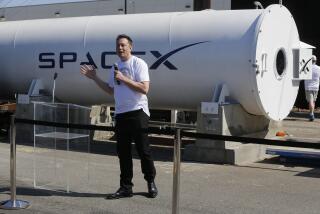Bechtel Gets $11-Million Contract in Hong Kong
- Share via
SAN FRANCISCO — Bechtel, the big engineering and construction firm, said Tuesday that it has won a contract with the Hong Kong government to help plan and manage construction of a $16-billion project that would include a world-class airport, railways, bridges and highways.
The $11.5-million contract, in effect through next year, is a boon to the privately held San Francisco company, which recently has begun emerging from an industrywide slump.
“This promises to be one of the most exciting megaprojects in the world,” Stephen D. Bechtel Jr., chairman and chief executive of Bechtel Group Inc., said in a statement.
Bechtel spokesman Rick Laubscher said the “entire collection of projects . . . will vault Hong Kong infrastructure to the head of the world pack.”
The project, which the Hong Kong government hopes will basically be completed in seven years, has an enormous scale.
Bechtel officials said it would be comparable to building a new airport the size of San Francisco International, a new freeway stretching from San Francisco to Silicon Valley, a new transit system similar to BART from San Francisco to San Rafael (in Marin County), plus a bridge about 10% longer than the 4,200-foot Golden Gate Bridge.
The new Chek Lap Kok Airport--to be built on a small island just north of Lantau Island, which is southwest of Kowloon and west of Hong Kong Island--would be the project’s centerpiece. Initially, it would have two runways but ultimately would grow to four and could accommodate 80 million passengers a year, about twice the number handled by Los Angeles International Airport last year.
It would replace the single-runway, World War II-vintage Kai Tak Airport in urban Kowloon.
“The project is vital to the future growth and prosperity of Hong Kong in the 21st Century,” said Melinda Parsons, a San Francisco-based spokeswoman for the British colony’s government.
The Chinese government stands to be a beneficiary if the project is completed on time in 1997, when Hong Kong reverts to Chinese sovereignty. The project is expected to get 60% of its financing from the private sector and 40% from the Hong Kong government, according to Parsons.
As envisioned by the government, the project would include an airport rail link and expressways running from Lantau Island to Kowloon to Hong Kong Island. In addition, it would include a suspension bridge and underwater rail and vehicular tunnels.
Much of the construction will be on reclaimed land. The densely packed island territory, with 5.7 million people, routinely uses fill to expand its limited land.
International Bechtel Inc., the Bechtel Group subsidiary that signed the contract, is also on a list of eight competitors for the next contract that Hong Kong expects to award on the project, to develop the master plan for the $4.5-billion airport portion.
However, Richard J. Begley, vice president of business development for Ralph M. Parsons Co., a Pasadena engineering firm, said he expects Bechtel to be disqualified from that portion because of its other management work on the project. Parsons is also a contender for the airport contract, which Begley said is expected to be awarded next week.
Begley described the Hong Kong government’s schedule for the project as “extremely aggressive.”
The estimated cost of $16 billion might seem low by U.S. standards. Laubscher explained that Hong Kong’s pro-development attitude tends to reduce costs for environmental and other studies. By comparison, the Bay Area’s BART system would cost about $7 billion in today’s dollars.
Bechtel recently has had a spate of activity. Last month, Executive Vice President John Neerhout Jr. was named project chief executive of the channel tunnel connecting Great Britain and France. The company also was chosen to conduct a feasibility study for the Soviet Union, which wants to design a Silicon Valley-style research center near Moscow.
The company’s annual report said it is working with 950 clients on nearly 1,600 projects and studies.
More to Read
Inside the business of entertainment
The Wide Shot brings you news, analysis and insights on everything from streaming wars to production — and what it all means for the future.
You may occasionally receive promotional content from the Los Angeles Times.









